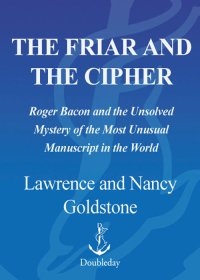
Ebook: The Friar and the Cipher Roger Bacon and the Unsolved Mystery of the Most Unusual Manuscript in the World
- Year: 2005
- Publisher: Random House
- Language: English
- mobi
From Publishers Weekly
The Goldstones, bibliophiles and authors of Out of the Flames and other books, offer a witty biography of controversial 13th-century Dominican friar Roger Bacon, whose Opus Majus "presented a way of thinking, of approaching science, that is virtually unsurpassed in the thousand years since its creation." According to the Goldstones, by challenging the accepted view of the Bible as the source of literal truth, it opened a schism between religion and science. The Church's response, recounted here, was filled with political intrigue, heroes and villains, and enough twists and turns to keep readers immersed. But this book's highlight is the story of a mysterious book discovered in 1912 and named for its owner, Wilfrid Voynich. The manuscript has a coded text enhanced by hundreds of illustrations depicting exotic plants, astronomical phenomena and strange "strings of tiny naked women cavorting in a variety of fountains, waterfalls, and pools." Various experts have attributed the manuscript to Bacon—but as it has kept its secrets from some of the world's greatest cryptanalysts, including some in the CIA and England's MI-8, as well as the largest supercomputers in the world, the attribution remains speculative. But these efforts make a compelling story for readers of the history of science and of code breaking. B&w illus.
Copyright © Reed Business Information, a division of Reed Elsevier Inc. All rights reserved.
From
In 1919, the discovery of the phrase "To me, Roger Bacon" in a centuries-old manuscript startled the antiquarian book trade. The world of cryptography also took notice, for the manuscript was in a still-unsolved cipher. Therein lies the historical detective story that the Goldstones tell. Essentially, the authors wrap the provenance of the Voynich manuscript, as it is called, around a biography of Roger Bacon, an English scholar of the 1200s. The Goldstones dynamically render the medieval time, describing the intellectual ferment--especially the implications of Aristotle's findings for Catholic doctrine--in which Bacon lived. Regarding Bacon as a pioneer of empiricism in science, the authors' contrast him with logician Thomas Aquinas, champion of biblical revelation as the way to truth. Were Bacon's ideas too hot, hence the cipher? Leaving the question open, the Goldstones then relate a rather rambunctious chain of possession that links John Dee, the Elizabethan magus who might have found the manuscript, with its present owner, Yale University. In engaging, entertaining fashion, the Goldstones offer history readers an intriguing mystery. Gilbert Taylor
Copyright © American Library Association. All rights reserved